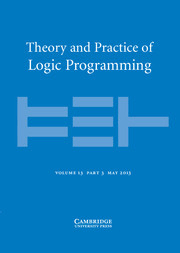
THEORY AND PRACTICE OF LOGIC PROGRAMMING
Scope & Guideline
Unraveling the Complexity of Logic with Rigor and Precision.
Introduction
Aims and Scopes
- Answer Set Programming (ASP):
A core area of focus, ASP is explored through various applications, such as scheduling, reasoning under uncertainty, and optimization problems. The journal emphasizes the development of new algorithms and frameworks that enhance the efficiency and applicability of ASP. - Temporal and Epistemic Logic:
Research on temporal logic and epistemic logic is prevalent, reflecting the journal's commitment to understanding dynamic systems and reasoning about knowledge and beliefs. This includes studies on model checking and reasoning in contexts with incomplete or evolving information. - Integration with Other Paradigms:
The journal highlights the integration of logic programming with other computational paradigms, such as neural networks, probabilistic reasoning, and constraint programming. This interdisciplinary approach fosters innovative solutions to complex problems. - Applications in Real-World Problems:
Practical applications of logic programming in domains such as healthcare, scheduling, and decision-making are a significant focus. The journal encourages submissions that demonstrate how logic programming can solve real-world challenges. - Formal Verification and Reasoning:
The journal extensively covers topics related to the formal verification of logic programs and reasoning about their properties. This includes developments in model checking, program synthesis, and verification techniques.
Trending and Emerging
- Neuro-Symbolic AI:
The integration of neuro-symbolic approaches, combining neural networks with logic programming, is gaining momentum. This trend reflects the need for systems that can leverage the strengths of both symbolic reasoning and data-driven learning. - Probabilistic Logic Programming:
There is a growing emphasis on probabilistic logic programming, which incorporates uncertainty into logic-based reasoning. This trend is crucial for applications requiring decision-making under uncertainty, such as in healthcare and autonomous systems. - Dynamic and Contextual Reasoning:
Research focusing on dynamic reasoning and context-sensitive approaches is on the rise. This includes developments in temporal logic and reasoning about actions in changing environments, which are essential for real-world applications. - Interdisciplinary Applications:
The journal is increasingly publishing research that applies logic programming techniques across various fields, such as bioinformatics, robotics, and social networks. This trend highlights the versatility and adaptability of logic programming methodologies. - Human-Centric AI and Explainability:
Emerging themes related to human-centric AI emphasize the importance of explainability and transparency in logic programming applications. This trend aligns with broader societal demands for accountability and interpretability in AI systems.
Declining or Waning
- Traditional Logic Programming:
There is a noticeable decline in research focused solely on traditional logic programming paradigms, as newer frameworks and methodologies gain traction. This includes a reduction in papers that do not integrate with modern developments in AI and machine learning. - Basic Prolog Applications:
Applications solely based on basic Prolog without extensions or integrations with other technologies are becoming less frequent. Researchers are increasingly seeking to explore more advanced techniques and applications that leverage the strengths of Prolog alongside other methodologies. - Static Analysis Techniques:
Static analysis techniques that do not incorporate dynamic or context-sensitive elements are waning. The field is shifting towards more flexible and adaptive analysis approaches that consider the evolving nature of logic programs. - Single-Domain Applications:
Research focusing on single-domain applications of logic programming is declining, as the community increasingly favors interdisciplinary approaches that address complex problems spanning multiple domains.
Similar Journals
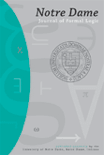
Notre Dame Journal of Formal Logic
Cultivating Insightful Perspectives on Logic and ReasoningNotre Dame Journal of Formal Logic is a premier academic publication dedicated to the advancement of research in the field of logical studies. Published by DUKE UNIVERSITY PRESS, this journal has been a significant contributor to the discipline since its inception in 1960, with an impressive convergence of scholarly articles expected to continue through 2024. With its focus on rigorous formal logic, the journal plays a crucial role in fostering discussions that bridge mathematics and philosophical inquiry, holding a notable Q2 ranking in the 2023 Logic category. Despite its non-open-access status, the journal reaches a wide audience of researchers, professionals, and students committed to exploring the foundational aspects of logics. Located in Durham, NC, it provides a platform for innovative thought and critical engagement within the logic community. With its impactful contributions, the Notre Dame Journal of Formal Logic stands as a vital resource for those seeking to deepen their understanding of both classic and contemporary logical theories.
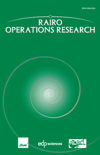
RAIRO-OPERATIONS RESEARCH
Empowering decision-making with cutting-edge operational methodologies.RAIRO-Operations Research is a distinguished journal published by EDP Sciences S A, focusing on the intricate fields of operations research, management science, and computer science applications. Established in 1977, this French-based journal encompasses a rich legacy of contributing to theoretical advancements and practical applications that equip researchers, professionals, and students with the insights necessary to navigate complex decision-making environments. With a notable Scopus ranking in various categories, including a Q3 position in Computer Science Applications, Management Science and Operations Research, and Theoretical Computer Science, the journal aims to foster innovation and share impactful research findings. As an insightful platform, RAIRO-Operations Research is essential for those seeking to deepen their understanding and enhance their expertise in operational methodologies, while also offering a range of access options for its wide readership. Delve into the journal to explore transformative research that pushes the boundaries of operations research.

Logical Methods in Computer Science
Advancing the frontiers of logic in computing.Logical Methods in Computer Science is a premier Open Access journal dedicated to fostering scholarly dialogue within the realms of Computer Science and Theoretical Computer Science. Established in 2004 and published by LOGICAL METHODS COMPUTER SCIENCE E V in Germany, this journal aims to bridge theoretical frameworks and practical applications, providing a platform for innovative research and discoveries. With an impressive HIndex reflecting its commitment to high-quality research, Logical Methods in Computer Science has achieved a Q2 ranking in both the miscellaneous and theoretical categories of computer science, indicating its growing influence in the academic community. Researchers, professionals, and students are encouraged to access and engage with the wealth of knowledge this journal offers, which is freely accessible to facilitate widespread dissemination of cutting-edge advancements in logical methods. With its convergence period extending from 2005 to 2024, Logical Methods in Computer Science continues to be a vital resource for those looking to explore the intersections of logic, computation, and mathematics.

INTERNATIONAL JOURNAL OF APPROXIMATE REASONING
Bridging Theory and Application in Uncertain EnvironmentsThe INTERNATIONAL JOURNAL OF APPROXIMATE REASONING, published by Elsevier Science Inc, stands as a pivotal resource in the domains of applied mathematics and artificial intelligence. Since its inception in 1987, the journal has evolved into a leader in its field, boasting an impressive impact factor and ranking within the top quartile for applied mathematics (Q1) and high standings in artificial intelligence and software categories according to the 2023 Scopus rankings. As researchers, professionals, and students delve into complex issues surrounding reasoning under uncertainty, this journal provides invaluable insights and cutting-edge research. In addition to its rich content, the journal's commitment to advancing knowledge in theoretical computer science further enhances its significance in fostering academic growth. While the journal does not currently offer open access, its rigorous peer-review process ensures that only high-quality, impactful studies are published, solidifying its role as an essential source for academics striving to remain at the forefront of their fields.
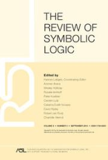
Review of Symbolic Logic
Fostering Innovation in Logic and PhilosophyReview of Symbolic Logic is a prestigious academic journal published by Cambridge University Press, dedicated to advancing the field of logic through critical analysis and innovative research. Established in 2008, the journal has become a key fixture in the academic community, particularly recognized for its contributions in the realms of logic, mathematics (miscellaneous), and philosophy. With an impressive classification of Q1 across multiple categories in 2023, it ranks within the top echelons of its field, standing at 15th out of 41 in Logic and 29th out of 90 in miscellaneous mathematics, positioning itself as essential reading for scholars and practitioners alike. Although not Open Access, the journal offers robust access options through institutional subscriptions, providing an expansive platform for the dissemination of high-quality research. Review of Symbolic Logic aims to foster a deeper understanding of symbolic logic's applications and implications while inspiring emerging scholars and seasoned researchers to further the dialogue within this vibrant area of study.

Bulletin of the South Ural State University Series-Mathematical Modelling Programming & Computer Software
Innovating Mathematical Insights for Tomorrow's SoftwareThe Bulletin of the South Ural State University Series-Mathematical Modelling Programming & Computer Software is a distinguished academic journal focusing on the interdisciplinary fields of mathematical modeling, programming, and software development. Published by the SOUTH URAL STATE UNIVERSITY, SCIENTIFIC RESEARCH DEPARTMENT, this journal serves as a platform for the dissemination of innovative research findings, methodologies, and applications in computational mathematics and related disciplines. With its ISSN 2071-0216 and E-ISSN 2308-0256, it has garnered attention within the research community, reflected in its rankings within the Q4 quartile across multiple categories in 2023, including Computational Mathematics and Software. Although it operates under an open access model, the journal emphasizes the importance of high-quality, peer-reviewed content to advance research education and practice in the Russian Federation and beyond. Researchers, professionals, and students are encouraged to contribute and access valuable insights, fostering collaboration among disciplines spanning mathematical theory, computational methods, and software development.
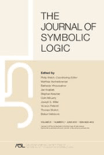
JOURNAL OF SYMBOLIC LOGIC
Challenging Conventional Thought Through Rigorous ResearchThe JOURNAL OF SYMBOLIC LOGIC, published by Cambridge University Press, stands as a leading platform for scholarly discourse in the realms of logic and philosophy. With a rich history dating back to 1938, this esteemed journal is dedicated to presenting cutting-edge research that pushes the boundaries of knowledge within symbolic logic and its applications. In 2023, it proudly holds a distinguished Q1 ranking in both Logic and Philosophy categories, reflecting its high impact and relevance in the academic community. Researchers and academics benefit from its rigorous peer-review process and contributions from leading scholars worldwide, ensuring the dissemination of high-quality research and critical theories. While the journal currently does not operate under an open access model, it remains a pivotal resource for professionals seeking to deepen their understanding of logical theories and philosophical inquiries. Explore the JOURNAL OF SYMBOLIC LOGIC to engage with scholarly articles that challenge conventional thought and inspire future research.
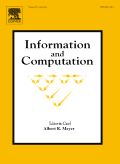
INFORMATION AND COMPUTATION
Advancing the Frontiers of Computational KnowledgeINFORMATION AND COMPUTATION is a peer-reviewed academic journal published by Academic Press Inc., Elsevier Science, dedicated to advancing the fields of computational theory and mathematics, computer science applications, and information systems. With an ISSN of 0890-5401 and an E-ISSN of 1090-2651, the journal provides a platform for innovative research that spans theoretical and applied perspectives. Acknowledged for its impact in the community, it holds a Q2 quartile ranking in several categories, including Computational Theory and Mathematics and Computer Science Applications, as of 2023. These rankings place it among the leading journals in its field, making it an essential resource for researchers, professionals, and students aiming to stay abreast of cutting-edge developments. While it does not currently offer Open Access options, the journal intends to foster scholarly communication and knowledge sharing from its inception in 1987 to its future issues expected through 2024. Located in the United States, at 525 B ST, STE 1900, SAN DIEGO, CA 92101-4495, INFORMATION AND COMPUTATION is committed to publishing high-quality research that influences the theoretical foundations and practical applications of its diverse disciplines.

Fuzzy Optimization and Decision Making
Innovating Solutions in Artificial Intelligence and OptimizationFuzzy Optimization and Decision Making, published by Springer, is a prestigious academic journal that has made significant contributions to the fields of Artificial Intelligence, Logic, and Software. With an impressive impact factor and a consistent ranking in the top Q1 quartile across its categories, this journal stands at the forefront of research dissemination in its domain. Established in 2002 and continuing through 2024, the journal focuses on the theoretical and practical aspects of fuzzy optimization methods and their applications in decision-making scenarios. The journal is highly regarded for its rigorous peer-review process and aims to present innovative research findings that inspire advancements in optimization techniques using fuzzy logic. Aimed at researchers, professionals, and students alike, Fuzzy Optimization and Decision Making serves as an essential resource for those looking to stay at the cutting edge of technology and methodology in mathematics and computer science.
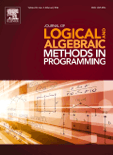
Journal of Logical and Algebraic Methods in Programming
Elevating Scholarly Discourse in Theoretical Computer Science.The Journal of Logical and Algebraic Methods in Programming (ISSN: 2352-2208, E-ISSN: 2352-2216) is a prestigious publication by Elsevier Science Inc, dedicated to advancing the fields of computational theory, programming logic, and mathematical methodologies. Esteemed in its commitment to high-quality research, this journal holds a Q2 ranking in 2023 for Computational Theory and Mathematics, and is recognized in various other disciplines including Logic and Software Studies. The journal’s open access policy enhances its visibility and accessibility, ensuring that cutting-edge research reaches a wider audience of researchers, professionals, and students. With an impressive convergence timeline from 2014 to 2025, it is a vital resource for those seeking to explore innovative algorithms and their applications in diverse areas of informatics. The Journal of Logical and Algebraic Methods in Programming represents a unique intersection of logic, mathematics, and software, carving a significant place in the scholarly discourse of theoretical computer science.